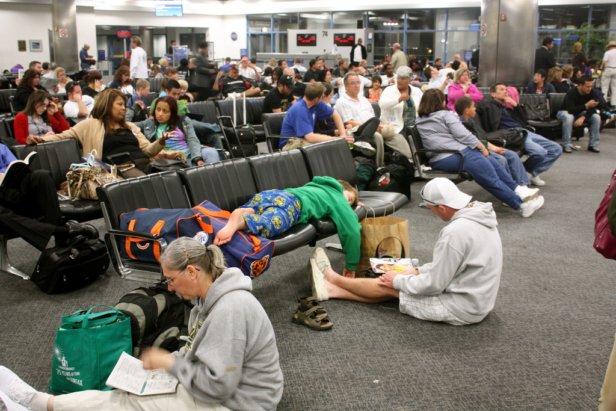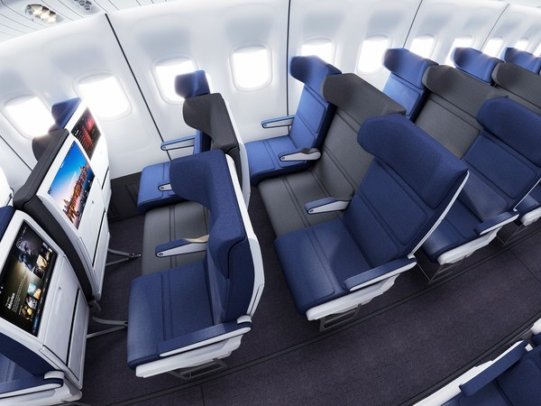Inequality is in the Air
 It’s been the time of year for flying. First I travelled from the UK
to a conference and then home to Canada for Christmas. Oh
flying… There have been some many advances in the last few
years. You arrive at the airport to be greeted by friendly staff who
quickly and efficiently check your suitcases. Because you got there
ahead of schedule, you’re offered a seat on an earlier flight which
you happily accept. You enjoy quick lines heading through security to
sit down in a comfortable chair to wait to board. On the plain you
stow your carry-on in the ample space and settle down into a roomy,
state-of-the-art seat with ample leg-room, specifically designed to
make it easy to sleep. Flight attendants offer you drinks and take you
through the gourmet menu for the trip. As you take off you look
through the large selection of complimentary entertainment options
which will keep you occupied throughout the flight. You arrive at your
destination rested and well-fed and give the crew a genuine thanks for
the service. Lines at border control are short and your luggage
arrives at the carousel immediately.
It’s been the time of year for flying. First I travelled from the UK
to a conference and then home to Canada for Christmas. Oh
flying… There have been some many advances in the last few
years. You arrive at the airport to be greeted by friendly staff who
quickly and efficiently check your suitcases. Because you got there
ahead of schedule, you’re offered a seat on an earlier flight which
you happily accept. You enjoy quick lines heading through security to
sit down in a comfortable chair to wait to board. On the plain you
stow your carry-on in the ample space and settle down into a roomy,
state-of-the-art seat with ample leg-room, specifically designed to
make it easy to sleep. Flight attendants offer you drinks and take you
through the gourmet menu for the trip. As you take off you look
through the large selection of complimentary entertainment options
which will keep you occupied throughout the flight. You arrive at your
destination rested and well-fed and give the crew a genuine thanks for
the service. Lines at border control are short and your luggage
arrives at the carousel immediately.
Of course, for most of us this description could hardly be more different from our actual travel experience. In fairness, in-flight entertainment has massively improved, even for economy passengers, at least on some airlines. And many airports do have very efficient check-in or security systems (although I don’t think I can come up with one which has both of these). However, by and large, only those people who inexplicably manage to end up in business class (tickets for which tend to be at least 4 times more expensive than economy) have the sort of experience I described.
There has always been business class service which offers a better experience for those able to pay, but in the past both the price and service differentials were smaller. Over the past decade ore two we have seen massive strides forward in business and first class service: priority lines to go through security, priority lines to go through border control (and believe me, for a non-EU traveller in Heathrow this is a big benefit), noise-cancelling headphones, seats which convert into lie-flat beds, premium airline lounges at an ever-larger number of destinations, the list goes on. Airlines show luxurious pictures of these facilities in their marketing, despite the fact that only a tiny percentage of passengers will ever get to use them.
As for the rest of us… Fees have been added to services which used to be included in the ticket price, such as having the ability to change flights, choosing your seats, checking bags, having a pillow on board, and being served a meal. On those flights where complimentary food is served, meal size and quality has gone down dramatically. Discount airlines go even further, charging for such luxuries as a carry-on bag and printing a physical boarding pass. Seats remain essentially unchanged from 40 years ago except that legroom has decreased and, on some of the big planes, they’ve gotten narrower thanks to the addition of an extra one in each row. In-flight service is offered is slower and less efficient than before, with the number of flight attendants cut. Fare structures have become increasingly incomprehensible and it has gotten even more difficult to accumulate enough frequent-flyer miles to be treated with some baseline level of decency. These changes also have a toll on operational efficiency. For example, with so many people now carrying luggage on board, flights are delayed as people fight for space in overhead bins and staff find themselves having to police carry-on allowances.
What we’ve seen is ever-increasing inequality in air travel. The rich get richer with new perks and amenities. On some airlines this is taken to truly ludicrous levels, with the offering of limousine service to first class passengers and exclusive terminals. The poor get poorer with fewer and fewer services offered and more and more ancillary charges. Some argue that service may have declined but at least flying is cheaper than ever. I’m not so sure. I strongly suspect that if you included all of the extra fees needed to get what used to be standard levels of service and ticket flexibility then tickets would be as expensive as ever.
Just as economic inequality has grown over the past 30 years, so too has inequality in air travel. I expect there is a causal link here. As some people have become fantastically wealthy they have gained the means to float through airports in their exclusive bubble of privilege. Meanwhile, as the incomes of most people have stagnated or declined, we’re stuck with lousy service. But in addition to direct causality, I believe these trends share a common source. Both have their origins in neoliberalism. On the one hand, this resulted in a weakened labour movement, a strengthened capitalist class, a rise in outsourcing, and a reduced social wage, preventing most people from sharing in the gains of growth. On the other hand, it has resulted in privatisation and deregulation of airlines and airports, as well as increased international competition from open sky agreements. Neoliberalism helped ruin flying.
Let’s fight back! Nationalise the airways! Fewer seats, more leg room, cheaper tickets for all! Eliminate economy class! Would that it were that simple. There is no way that flying would be affordable for the great majority of people if everyone had current first/business class seating. There will always be a tension between making flying cheap for everyone and making it of decent quality of everyone. Furthermore, flying is a major source of greenhouse gases and one without any immediate prospect of fixing. Ecologically, it is currently in our interest to cram as many people into an airplane as possible, while ensuring that as few airplanes are flying as possible.
 By all means, nationalise and merge the airlines. It would allow
national planning and optimisation of the network as a whole, along
with a greater choice of flights. There would no longer be a need to
introduce hidden fees so as to appear cheaper than the competition. We
could restore a number of services which are relatively inexpensive
and have little environmental impact. But we must not build our
transport policy on simple populist grounds.
By all means, nationalise and merge the airlines. It would allow
national planning and optimisation of the network as a whole, along
with a greater choice of flights. There would no longer be a need to
introduce hidden fees so as to appear cheaper than the competition. We
could restore a number of services which are relatively inexpensive
and have little environmental impact. But we must not build our
transport policy on simple populist grounds.
Where practical, we’ll have to replace flying with rail, which is more comfortable anyway. We’ll also have to research alternatives to jet fuel. Meanwhile, let’s equalise the flying experience! Strip out the absurd first class seats and give a little bit more space in economy. Bring back decent in-flight meals (with real table-wear, please!), a complimentary checked bag, pillows and blankets on short haul flights, and hot towel service. Invest some R&D into making economy seats more comfortable while still affordable. Get rid of priority lines at airports and bring in some extra staff so that everyone can be processed efficiently and make the seats by the gates a bit more comfortable.
Perhaps under fully automated luxury communism everyone will experience first class levels of comfort. Until then, let’s at least eliminate the inequities of flying and make flying under socialism a vaguely human experience.
comments powered by Disqus
